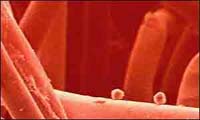Future generations of people to live for 120 years and more
The main hazard of life is that it inevitably leads to death. But is it not possible to slow down the ageing process? If we cannot live forever, then can we at least stay young for a bit longer? Scientists are working on one of science’s most fundamental questions in many laboratories around the world, including in Russia. And today they are much nearer to finding an answer than the medieval alchemists who unsuccessfully searched for the elixir of youth. Cagliostro and the count of St. Germain would already have put these discoveries into practice, but scientists are being cautious. In any case, the idea of immortality has once again garnered support. One of the ways to achieve it is to search for the genes responsible for ageing the body. The other way involves unraveling the riddle of mitochondria which act as the cell’s “power station”.

The participants of a conference which took place in the middle of March in Oxford came to the conclusion that developments in science will soon enable the life expectancy in developed countries to be increased to 120 years. Richard Miller from the University of Michigan said that experiments on lab mice and rats, whose genetic make-up is close to that of humans, will enable one to extend life by 40% simply through reducing the energy value of food. This is a habit which remains from one’s youth, even when the body does not need this kind of diet any more. The gene Sirt1, responsible for activating the necessary processes, has already been found. A primate which was given a low-calorie diet died at the age of 41, which is the equivalent of 123 human years.
9 genetic mutations have been detected allowing mice to live 50% longer, and in worms and fruit flies dozens of these genes have been found. Aubrey de Grey from Cambridge makes an even more optimistic claim: the first person who will live to be 1000 years old has already been born. If a means to extend life by 30-40 years is found, it will allow us to live until the next scientific breakthrough and delay death for slightly longer. However, the director of the Institute of Physical and Chemical Biology at MSU Vladimir Skulachev has a very low opinion of De Grey’s work.
Skulachev himself is a respected leader in the study of “immortality”, which is proven by a recent publication of his in the prestigious journal Nature. Experiments with a substance synthesized in Russia are being carried out on mice in several Russian scientific centres. Experimental production of this substance has not been ruled out. In the Oncocentre experiments on mice with a human form of skin cancer have already begun. Skulachev’s scientific research is being generously financed by the aluminium magnate Oleg Deripaska, and it is the first time that the scientists are receiving the amount of money they deserve. The essence of Skulachev’s work is to search for a means to counter the effect of toxic forms of oxygen which penetrate the cell membrane, where in a second they damage the genes and lead to ageing. Cells do have defense mechanisms against this, but sometimes they refuse to defend themselves. This is a mechanism of voluntary death, apoptosis, which is employed when the cell needs to be excluded from the duplication process. Apoptosis of a whole organism is the outstanding characteristic of Skulachev’s theory. The scientist thinks that it is possible to disable the programme for the ageing and death of an organism, and therefore shut off the mechanism which shortens our life. Skulachev is sure that old age is an illness whichneedsto becured in the same way as a heart attack or cancer.
Foreign geneticists have also had success. David Sinclair from Harvard introduced resveratrol, a chemical substance found in red wine, into the diet of fruit flies and worms, and the length of their life increased by 14-70%. “The world of science didn’t even know that methods such as these existed,” says Sinclair. “The current wave of research promises to extend life so much that at the age of 90 you will feel like 60. Science into ageing “has split the atom”. And the question now is not whether it is possible, but when it will take place.”
The hypothesis has been expressed that ageing is linked to when the body ceases to grow. And the theory was expounded that it is necessary to remove toxins which have built up in the intestines through regular enemas. The results of the testing of this theory, which was developed by the Nobel Prize winner Ilya Mechnikov, turned out to be inconsistent, but the scientist died at the height of his powers. Another Nobel Prize winner, Launus Poling, who lived to extreme old age, believed in the miraculous possibilities of vitamin C, a dose of which should consist of 10 grams per day. There have been popular theories on the beneficial effect of a weak radioactive force, and also of an alternating magnetic field which animated rats, but the effect this had on the duration of their life was not measured.
But the most frequently tested elixir of youth is low-calorie food, the effect of which is achieved through the gene Sirt1. One has to supplement one’s diet with regular exercise. The only limitation is that, with age, you have to reduce the load of exercise.
Moreover, peaceful sleephelps to extend youth. Jakov Tsiperovich lives in Germany , and after waking from a lethargic sleep stopped ageing and at 52 years old looks like 20. In 1958 a decrepit 15-year old lap dog was put to sleep for 3 months with sleeping draught. When it woke up, its muscle tone had increased, fur began to grow, and its sexual instinct returned. The dog lived for 6 more years, before it was killed by a chimpanzee.
In Soviet times Professor Bogomolets promised to beat old age, and was allocated enormous funds for his work. The professor died, not having even reached 70. Stalin was disgusted: “Scoundrel, he cheated me!”. Other famous figures who worked in this field include the ancient Greek Galen (2nd century BC), eastern philosopher and doctor Avitsenna (11th century) and the Englishman Roger Bacon, who is considered one of the founders of modern science. Bacon believed that the recipe for immortality was known in ancient times, when prophets headed by Methuselah lived for several hundred years. But then the recipe was lost, and it was the duty of scientists to recover it.
The successes attained by transplantology are so great that it will not be long before the first transplant of a head or even a single brain. This would mean that the head or brain of an elderly person would be attached to the healthy body of a young individual who, for example, died in a car accident. 60 years later the operation could be repeated, and so that would give you a 200-year old millionaire. Millionaire, because such an operation will undoubtedly be extremely expensive.
A very dangerous, even terrifying problem comes to mind. Will a millionaire not want to “order” himself a new young body? Unfortunately, many will want to…
Sergei Leskov for Nauka Izvestiya
Translated by James Platt
Subscribe to Pravda.Ru Telegram channel, Facebook, RSS!




